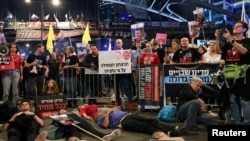Israel is sending a delegation back to Cairo for more talks on the details of a cease-fire.
The Israeli move came a day after Hamas made a surprise announcement that it accepted an Egyptian cease-fire proposal that Israel had previously accepted.
But on Tuesday, Israeli officials said that the terms Hamas accepted are not the same as those in the original Egyptian proposal, and that the changes that Hamas is demanding make it impossible for Israel to agree.
Israeli officials said the first stage of the deal envisions the release of 33 “humanitarian” hostages, meaning women, the elderly and the sick, in exchange for a six-week cease-fire and the release of hundreds of Palestinian prisoners.
But now Hamas says that some of those 33 who would be freed have died. There are also questions on the timing of the release and how many Palestinian prisoners will be freed for each hostage.
Brigadier General Yisrael Ziv, a former commander of the Gaza district, said that Israel’s first priority must be to bring the hostages home.
“The first priority is to maximize the option for the deal,” Ziv said. “We understand that the time is running out for the life of the hostages and the maximum pressure is about that – how many people alive we can evacuate through such a deal.”
Israel also has questions about reported guarantees that the U.S. and Egypt gave Hamas that Israel will not restart the war in Gaza and that the cease-fire will continue indefinitely.
A U.S. government spokesman would not comment on the reports.
Israeli government spokesman David Mencer said that even though the Hamas proposal falls far short of what Israel wants, Israel will negotiate in good faith.
“The war cabinet unanimously decided that Israel will continue its operation in Rafah in order to apply military pressure on Hamas to release our hostages and achieve all the war’s objectives,” Mencer said. “Despite Hamas’ grandstanding, Hamas’ proposal is far from Israel’s core demands. Nevertheless, Israel will dispatch a ranking delegation to Egypt to maximize any chance of an agreement on terms acceptable to Israel.”
On Tuesday, Israeli tanks and troops took over the Palestinian side of the crossing between Israel and Egypt. The Palestinian Authority called on the U.S. to stop Israel from invading the city of Rafah.
Ziv said the Israeli action to take over the crossing was a limited operation and not the large-scale invasion Israel has threatened.
“The purpose of the operation is mainly to leverage the negotiations being done this time,” Ziv said, “trying to get a better deal, or to lower the demands of Hamas asking Israel to stop the war and to get into a full cease-fire.”
As the war hits the seven-month mark, the Hamas-run Health Ministry said the death toll is close to 35,000, although that includes fighters and civilians.
More than 1,300 people in Israel have been killed – most of them in the initial October 7 attack by Hamas – and more than 130 Israelis are still being held hostage by the militant group.






